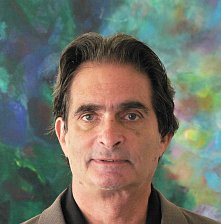
Conventional physics argues that all the tiny particles which make up the universe are:
neutral and unconscious and dead—
And yet, say these same physicists, the brain, which is only a collection of such particles, is conscious.
The absurdity of this contradiction can only be sustained by monopolistic authority.
Consciousness is as non-material and paranormal as paranormal can be.
Without it, obviously, we would not be communicating right now. We would not be here. We would not Be.
Categories like telepathy, ESP, clairvoyance, and telekinesis don't tell the whole story. They're just a pale reflection of the fact that Existence itself is paranormal.
Consensus reality, on the other hand, is a stage play based on the notion of “normal.”
So here we are, and we're all paranormal, and we're living in a normal world. If that isn't a joke, if that isn't a sickness, if that isn't a conspiracy, what is?
The Matrix can spawn one Agent Smith after another, like a machine turning out products, and still the incalculable and magical fact of consciousness endures beyond the machine.
The stage play called reality is dedicated to top-down control, because consciousness, if unleashed as creative power, if allowed to flourish, would explode the stage flats and take us out into an open sky of such varied magic it would ring in a multiverse of unpredictable beauties…none of which require supervision from the psychopaths behind the curtain.
Making life into a machine is the goal of elites. We, on the other hand, see something else.
We don't need to define what that is in a lab. We certainly don't need to develop algorithms that purport to define what we are.
…Forty years ago, I was hired to tutor a young girl in arithmetic. She was having trouble with long division. She was in sixth grade, and she couldn't do division. This is what I was told
So one night I walked into a very large house in West Los Angeles. The mother, tall and thin, a remote ghost, led me into a cavernous living room, in the center of which sat her daughter, at a small table.
The mother gestured vaguely and glided off into unknown rooms and left the two of us alone.
I sat down. I gave the girl a couple of division problems to work, and she couldn't. She grimaced.
“Don't worry,” I said. “We'll fix it.”
I asked her to explain what she was confused about. I wanted to get her to talk. She thought about it and recalled a few experiences in arithmetic, from third grade.
I sat there and listened. As she talked, she raised her head and started looking at me. There we were, in a huge quiet house, a dead house, two people, two strangers.
Something clicked. She began smiling.
She said, “I can read very well, but I can't do division.”
I smiled, too, because it seemed there was a joke here, and it had nothing to do with math. It had to do with her whole life, the house, her parents.
Neither of us quite knew what was going on, but we were in the moment.
Without thinking, I said, “You're in prison.”
She laughed.
I said, “Right now, I don't why but I feel like I'm in prison, too.”
We both laughed.
That was all it took.
I brought her back to the beginning of division, started from the bottom, and we worked our way up to more complicated problems. It took about an hour and she was fine.
I felt like we were two undersea divers, our oxygen lines were crossed and pinched, and we'd worked out the kinks. We could breathe again.
After that, we talked about her school, my days in school, teachers. She mentioned tomatoes. She said she was growing them in the back yard.
She took me through a few large rooms into the yard, turned on the pool lights, and we walked along a path to her garden, by a high fence.
The vines were tall, and the red tomatoes looked splendid.
We walked back and sat down at a table by the pool and looked at the water. All of a sudden, things shifted. The night sky was wide open. I could feel the air on my face. I could smell flowers.
“It's a nice yard,” I said.
She nodded. “I'm reading everything Charles Dickens wrote,” she said.
“Why?” I said.
“Because it doesn't seem to end,” she said.
I thought about it.
“Some things are like that,” I said.
“No,” she said. “Everything is like that.”
I looked at her.
She was smiling. Her face was radiant.
“Remember what you just said,” I said.
“I will,” she said.
She put out her hand. I shook it.
That was the end of the lesson.
I'll always remember it, too.
Jon Rappoport
The author of two explosive collections, THE MATRIX REVEALED and EXIT FROM THE MATRIX, Jon was a candidate for a US Congressional seat in the 29th District of California. Nominated for a Pulitzer Prize, he has worked as an investigative reporter for 30 years, writing articles on politics, medicine, and health for CBS Healthwatch, LA Weekly, Spin Magazine, Stern, and other newspapers and magazines in the US and Europe. Jon has delivered lectures and seminars on global politics, health, logic, and creative power to audiences around the world. You can sign up for his free emails at www.nomorefakenews.com



